Contents
Market Overview
Macro Review
Uncertainty in the UK and Japan dominates the discussion. After Jeremy Hunt was appointed as the UK’s Chancellor of Exchequer, he had metaphorically locked the Prime Minister in the attic and unwound what we all understood as Trussonomics. Gilts, GBP and UK equities rallied on these measures, but reset lower on Friday. With the Prime Minister resigning after 44 days in office, the leadership contest marked further event risk for UK assets, especially as Boris Johnson entered the ballot, alongside Rishi Sunak. A third challenger (Penny Mordaunt) is all but certain into what will be a turbulent weekend of hustings. Five major events occurred in global FX other than with GBP this week. First, JPY traded above 150 as the Bank of Japan (BoJ) defended “Yield Curve Control” that is proving anything but controllable. The next credibility test for the BoJ will come with the MPC decision on Thursday. Second, EURUSD fell through the 50-day moving average. Third, the Colombian peso was in free-fall but the finance minister had ruled out capital controls, although this didn’t stop the 5-year CDS breaking above 400 bps. Fourth, the Hungarian forint broke above 430, amid broader weakness within CEE. Fifth and finally, China’s CNH slumped to a record low of 7.28 while it kept the LPR rates unchanged this week after previously holding the MLF rate. Meanwhile, U.S. Treasuries rose to 2008 highs as the Fed’s Harker reiterated that a policy rate well above 4% by year-end was likely and Governor Cook suggested that ongoing rate hikes were likely. Meanwhile, European rates widened on higher inflation breakevens, rather than real yields, as natural gas prices rose sharply once again, and German PPI remained elevated at nauseous levels. Emerging markets were less volatile than developed markets, which we are all becoming accustomed to. In Turkey, President Erdogan goaded CHP President Kemal Kilicdaroglu to run against him in the 2023 election, who would in theory represent the “Alliance of Six”, yet the group of political parties are still divided. The CBRT also cut interest rates by 150 bps, but the main headline was the increase in the “securities maintenance ratio” from 3% to 5%. This caused Turkey’s local currency bonds to rally some 300 bps as banks are set to buy TRY88bn by month-end. This allowed the CBRT to be more aggressive than consensus and cues further tightening in November. Finally, the Biden Administration announced the planned sale of 15m barrels from its strategic reserves, which is the final installment of the 180m release from March, although it does put the U.S. on a confrontational path with OPEC+ should the U.S. release more over winter. In strange fashion, markets seem to be under-reacting to U.S. midterm elections.
EM Credit Update
Emerging market sovereign credit (cash bonds) ended the week -0.8% with spreads 2 bps tighter. Outperformers over the week were Ecuador, Tunisia and Mongolia while Ghana, Sri Lanka and Zambia underperformed. Amid the weakness for distressed high yield sovereigns, Pakistan, Zambia and Ghana traded down to all-time lows in cash price terms, just as Ecuador was the outperformer on a potential buyback of Eurobonds. Moody’s also upgraded the Angolan outlook to positive from stable, while Fitch went the other way with Peru and cut from stable to negative. Both rating events had little bearing on credit spreads.
The Emerging Market ETF (EMB) was down 1.7% which reflects a yield move of 26 bps, which includes the U.S. Treasury widening. With U.S. Treasuries widening 15-35 bps over the week, it was inevitable that U.S. IG would trade soft (LQD -2.2%) but U.S. HY was actually up 0.1% (HYG). This was broadly in line with U.S. equities, where SPY and QQQ were unchanged over the week. European IG and European HY were down 0.9% and 0.4%, respectively, but European Hybrids (EHYB) were flat and European CoCos rallied (COGO +1.5%), where higher beta generally outperformed in all currencies of fixed income this week. Speaking of outperformance, Turkish equities posted fresh all-time highs this week in TRY, where the USD index (TUR) was also up 8.6%. This emerging market equity outperformance was followed by Saudi Arabia (+4.9%) and Brazil (+4.1%). However, Taiwan (-2.3%), China (-2.3%) and Qatar (-1.4%) lagged the broader complex within emerging market equities as EEM was unchanged over the week.
The Week Ahead
The ECB and BoJ rate decisions are the standout events of next week. The slew of 3Q earnings will also dominate, along with flash European PMIs, Ifo survey and 3Q GDP from both the U.S. and Germany. Emerging market rates decisions are due from Brazil (13.75%) and Colombia (10.0%). Importantly, Brazil is expected to hold, which would represent an end of the tightening cycle. Meanwhile, the focus on Colombia is not so much the 100 bps hike that is expected, but the reaction to FX and how it responds to the question of capital controls. Credit Suisse will also present its strategic update on Thursday, which will undoubtedly be in focus given the volatility earlier this month. Finally, at some point next week we may also be in receipt of China’s delayed 3Q GDP release.
Highlights from emerging markets discussed below include: China’s 20th Party Congress focused on tech self-reliance and national security; Turkey’s Central Bank cuts another 150bps, targets single digit policy rate.
Fixed Income
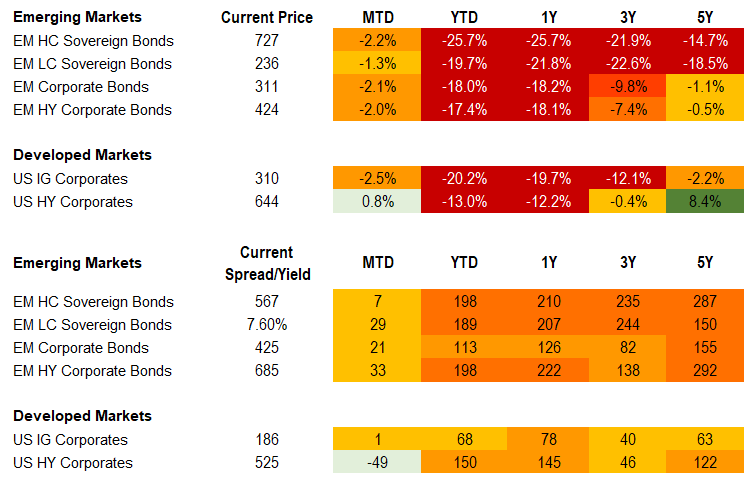
Equities
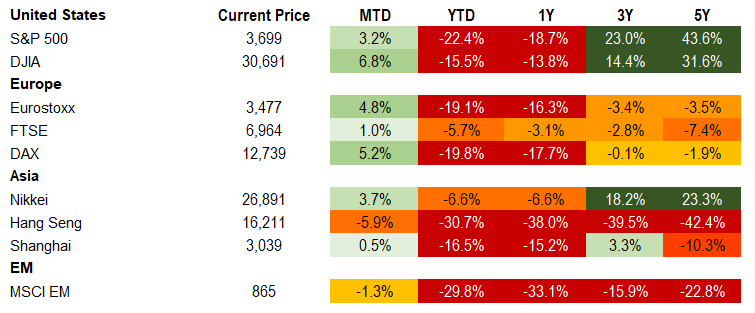
Commodities

Source for data tables: Bloomberg, JPMorgan, Gramercy. EM Fixed Income is represented by the following JPMorgan Indicies: EMBI Global, GBI-EM Global Diversified, CEMBI Broad Diversified and CEMBI Broad High Yield. DM Fixed Income is represented by the JPMorgan JULI Total Return Index and Domestic High Yield Index. Fixed Income, Equity and Commodity data is as of October 21, 2022 (mid-afternoon).
Emerging Markets Weekly Highlights
China’s 20th Party Congress focused on tech self-reliance and national security
Event: The 20th Party Congress began on October 16th with publication of a work report and speech from Xi Jinping which emphasized areas of national security, technology independence, and law-based governance. Xi reiterated preference for peaceful reunification with Taiwan, and as largely anticipated, there has been no indication of evolution in Zero Covid Policy (ZCP). The closing ceremony will be held on Oct 22nd where the party will announce members of the 20th Central Committee. Meanwhile, 3Q GDP data has been delayed amid focus on the political event.
Gramercy commentary: The report and speech delivered at the start of the Party Congress as well as likely forthcoming personnel appointments, including Xi as the new General Secretary, largely reinforces policy continuity, ideology, and cements Xi’s strength, despite a challenging economic backdrop. Structurally speaking, we continue to expect a reduced priority on fast paced growth in favor of better quality and inclusive growth which should guide the evolution of and commitment to existing policies led by the dual circulation model. This prioritizes the strength of the domestic economy, innovation, and supply chain resilience while retaining access to global markets and investment. While the Party Congress itself is not typically a policy-specific event, its conclusion could create room for additional targeted measures and policy adjustment into the 2023 NPC. On the delay in GDP data, we see this as a prioritization of the Party Congress and associated events. We do not necessarily expect a particularly weak print once released, despite economic activity that remains under pressure, but the delay does dent credibility.
Turkey’s Central Bank cuts another 150bps, targets single digit policy rate
Event: The Central Bank of the Republic of Turkey (CBT) lowered its main policy rate by 150 bps to 10.5% and signaled it will likely complete the latest monetary policy easing cycle that started in August with another 150 bps to 9% at the November meeting.
Gramercy commentary: Against a backdrop of headline inflation (CPI) running at 83.5% YoY in September and producer prices (PPI) at 151.5% YoY, the CBT justified its policy decision with growth slowdown risks driven by external factors and stated that it was “critically important that financial conditions remain supportive to preserve the growth momentum”. Looking across emerging markets, almost all of CBT’s peers are aggressively hiking rates in an attempt to control inflation and support their currencies amid a “draconian” developed market policy tightening bias. In the current global macro environment, CBT’s politically imposed uber-dovish monetary policy approach could be characterized as a car driving against traffic on the highway whose driver is convinced that it is actually all other motorists who are on the wrong side of the road. While a number of macro-prudential policies and other regulatory financial repression measures have been able to preserve relative optical stability in Turkish markets thus far, the ongoing economic policy experiment continues to exacerbate Turkey’s macroeconomic distortions and imbalances. Those include, among others, completely unhinged inflation dynamics, ballooning real estate and equity prices (seen locally as hedges against skyrocketing inflation), high dollarization, and increasing medium-term fiscal risks. The Erdogan Administration’s ability to avoid a loss in confidence and to muddle through with current policies until elections in 1H 2023 hinges on securing additional external funding on an ad hoc basis (mainly from Russia and the GCC). However, as benign Current Account dynamics from the strong summer tourism season fade and global financial conditions continue to tighten, we expect BoP pressures are likely to increase into year-end and early 2023.
Emerging Markets Technicals
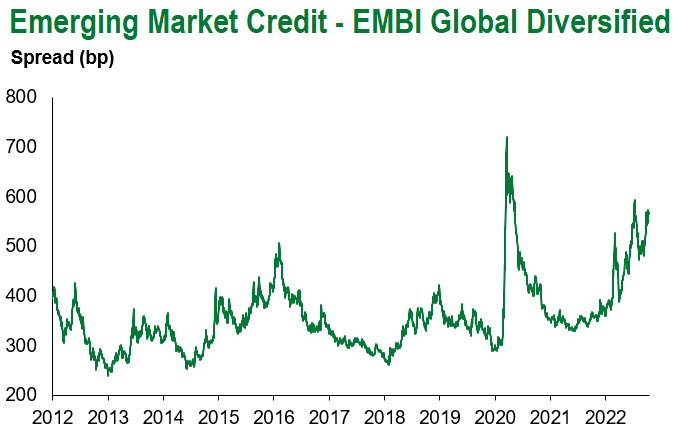
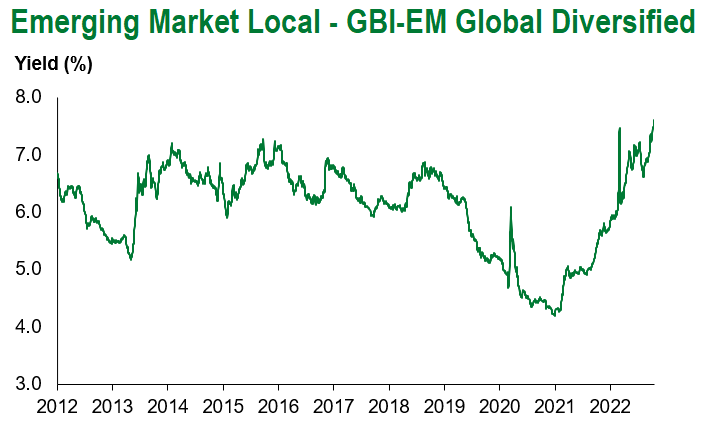
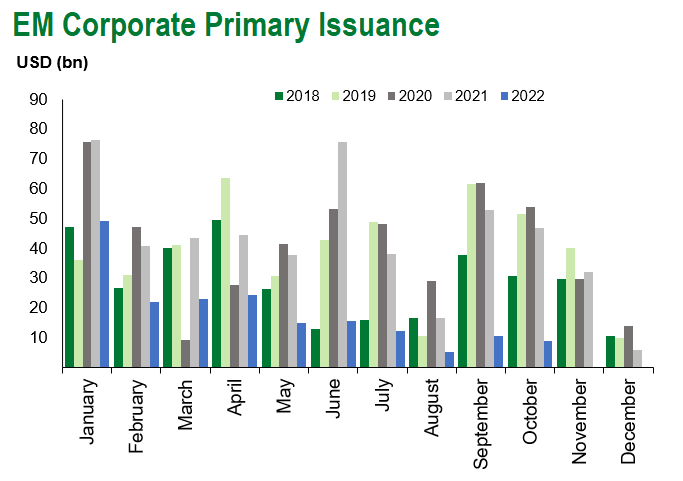
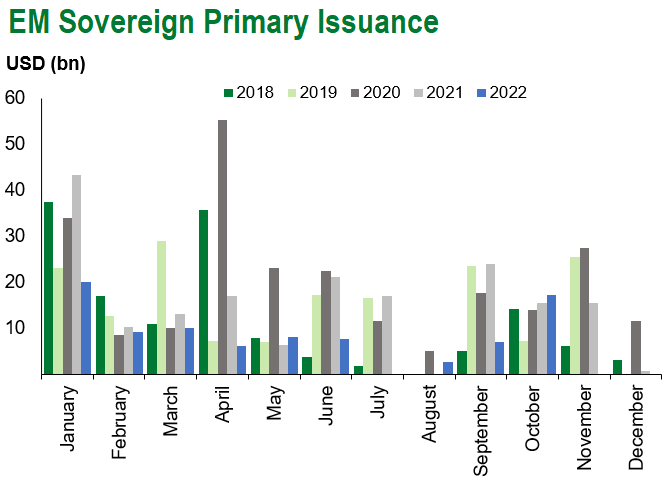
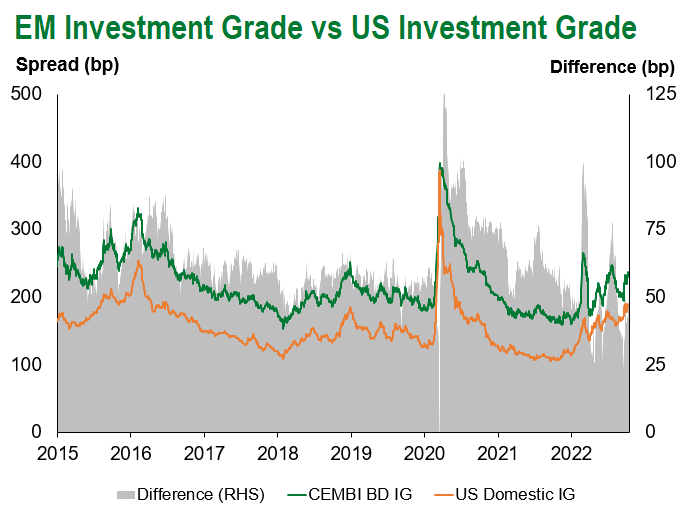
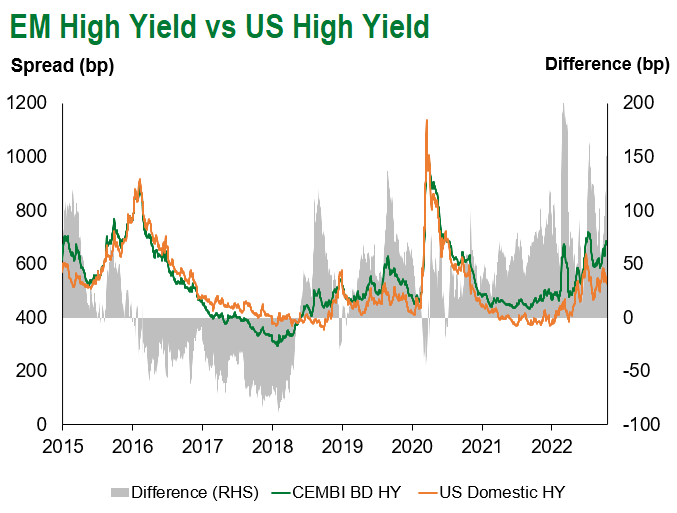
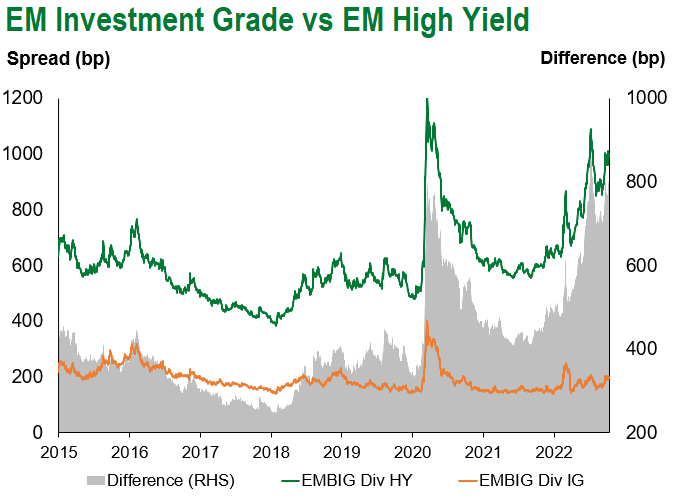
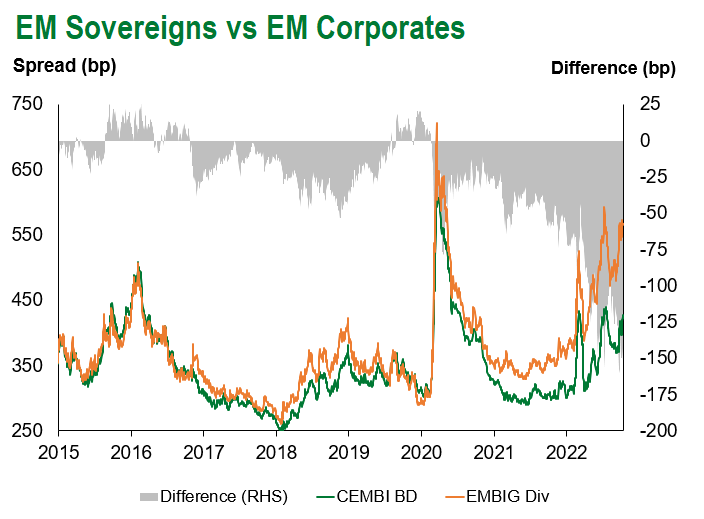
Emerging Markets Flows
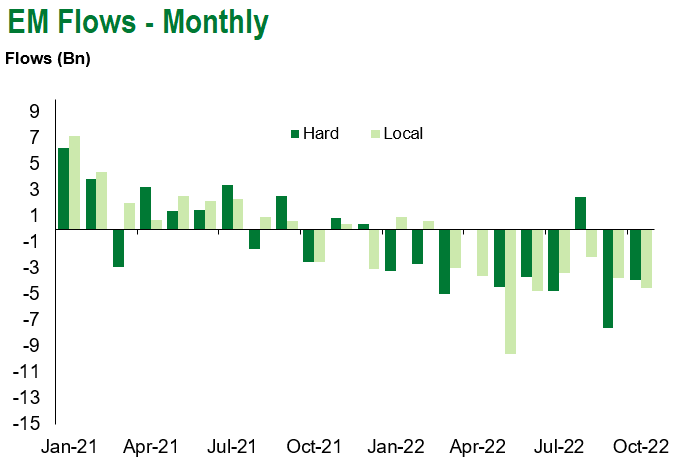
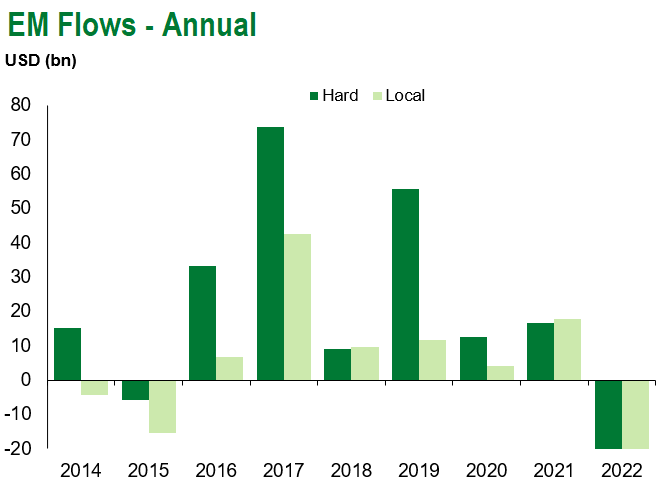
Source for graphs: Bloomberg, JPMorgan, Gramercy. As of October 21, 2022.
COVID Resources:
Johns Hopkins COVID-19 Case Tracker
For questions, please contact:
Kathryn Exum, CFA ESG, Director, Co-Head of Sovereign Research, [email protected]
Petar Atanasov, Director, Co-Head of Sovereign Research, [email protected]
James Barry, Director, Deputy Portfolio Manager, [email protected]
This document is for informational purposes only. The information presented is not intended to be relied upon as a forecast, research or investment advice, and is not a recommendation, offer or solicitation to buy or sell any securities or to adopt any investment strategy. Gramercy may have current investment positions in the securities or sovereigns mentioned above. The information and opinions contained in this paper are as of the date of initial publication, derived from proprietary and nonproprietary sources deemed by Gramercy to be reliable, are not necessarily all-inclusive and are not guaranteed as to accuracy. This paper may contain “forward-looking” information that is not purely historical in nature. Such information may include, among other things, projections and forecasts. There is no guarantee that any forecasts made will come to pass. Reliance upon information in this paper is at the sole discretion of the reader. You should not rely on this presentation as the basis upon which to make an investment decision. Investment involves risk. There can be no assurance that investment objectives will be achieved. Investors must be prepared to bear the risk of a total loss of their investment. These risks are often heightened for investments in emerging/developing markets or smaller capital markets. International investing involves risks, including risks related to foreign currency, limited liquidity, less government regulation, and the possibility of substantial volatility due to adverse political, economic or other developments. References to any indices are for informational and general comparative purposes only. The performance data of various indices mentioned in this update are updated and released on a periodic basis before finalization. The performance data of various indices presented herein was current as of the date of the presentation. Please refer to data returns of the separate indices if you desire additional or updated information. Indices are unmanaged, and their performance results do not reflect the impact of fees, expenses, or taxes that may be incurred through an investment with Gramercy. Returns for indices assume dividend reinvestment. An investment cannot be made directly in an index. Accordingly, comparing results shown to those of such indices may be of limited use. The information provided herein is neither tax nor legal advice. Investors should speak to their tax professional for specific information regarding their tax situation.
